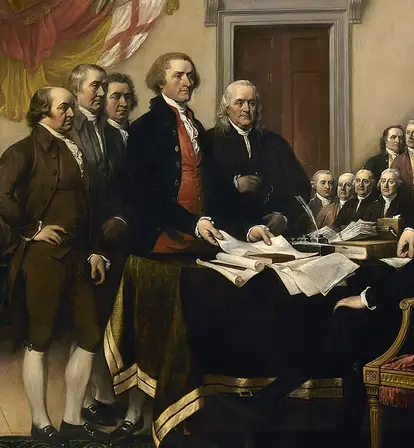From George Washington and Alexander Hamilton to Ben Franklin and Thomas Jefferson, the men who forged the nation also committed some unspeakable acts.
Even though America’s founding fathers have been mythologized into godlike figures, it’s important to remember that they were human and were, of course, subject to flaws. These men have been carved in stone, but they were anything like the perfect sculptures their resolute faces on Mount Rushmore suggest they were. They were disloyal, narcissistic, and abusive.
In order to really know who the founding fathers were, we must examine them in full, including their pitfalls — which range from petty to downright evil.
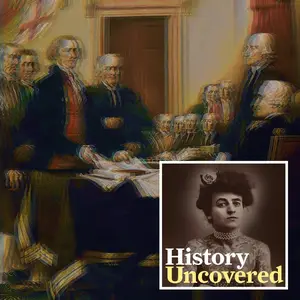
John Adams Abused His Presidential Power
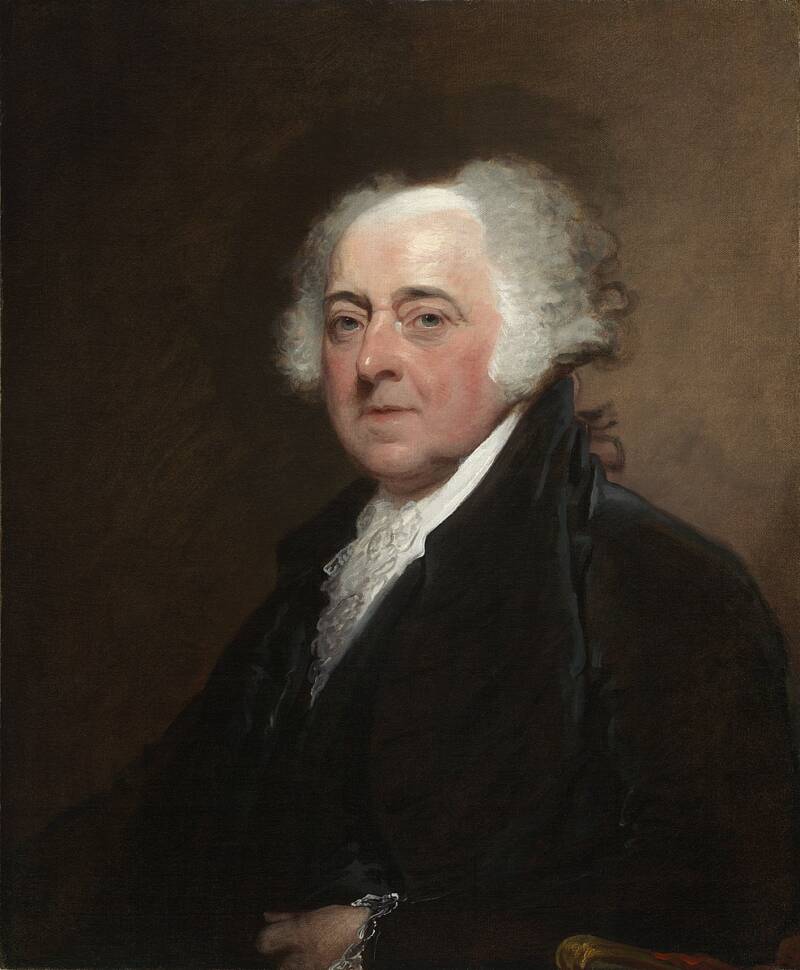
Wikimedia CommonsWhile president, John Adams made it illegal to criticize him.
John Adams was the second president of the United States, he wrote the oldest constitution still in use today, he was a founding father, and the first president to live in the White House.
But the founding father was also borderline dictatorial.
Adams didn’t take criticism well and despised those who voiced it, so when Congressman Matthew Lyon wrote that Adams was “swallowed up in a continual grasp for power, in an unbounded thirst for ridiculous pomp, foolish adulation and selfish avarice,” he found himself in trouble with the president.
In 1798, Adams signed the Alien and Sedition Acts, which made it illegal to “write, print, utter, or publish… any false, scandalous and malicious writing or writings” about the president or other officials of the executive branch.
John Adams claimed he’d rendered free speech punishable by law as a matter of national security, considering the new nation was nearing a war with France. After Rep. Lyon made those critiques, he was accused of being “a malicious and seditious person, and of a depraved mind and a wicked and diabolical disposition.”
Lyons was consequently fined $1,000, convicted of wreaking undo incitement, and sentenced to four months in prison. To Adams’ chagrin, Lyon campaigned for reelection behind bars and won as “a martyr to the cause of liberty and the rights of man.” There was a parade upon his February 1799 release.
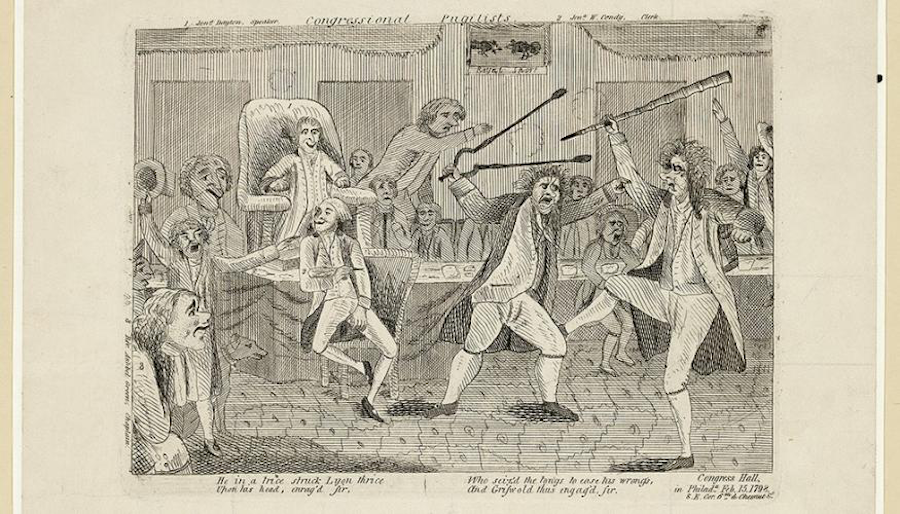
Library of CongressAn illustration depicts representatives brawling during a session of congress the year the Alien and Sedition Acts were signed into law.
But worse off than Congressman Lyon was newspaper editor Benjamin Franklin Bache, the grandson of Benjamin Franklin. Bache wrote that the president was “old, querulous, bald, blind, crippled,” and “toothless.” Bache was assaulted and his home was vandalized. Meanwhile, his pregnant wife received numerous death threats.
Meanwhile, the “Alien” part of the law made it as easy as possible for the president to deport immigrants and made it much harder for naturalized citizens to vote.
More than a dozen people were convicted under the Alien and Sedition Acts. The people protested and Thomas Jefferson used the vehement opposition to his advantage during the 1800 presidential election — and won. The Alien and Sedition Acts expired during Adams’ term and Jefferson pardoned all who were convicted under the law and most fines were refunded.
As petty as he was authoritarian, Adams became the first president to not attend the inauguration of his successor.
George Washington Broke A Promise To Free His Slaves
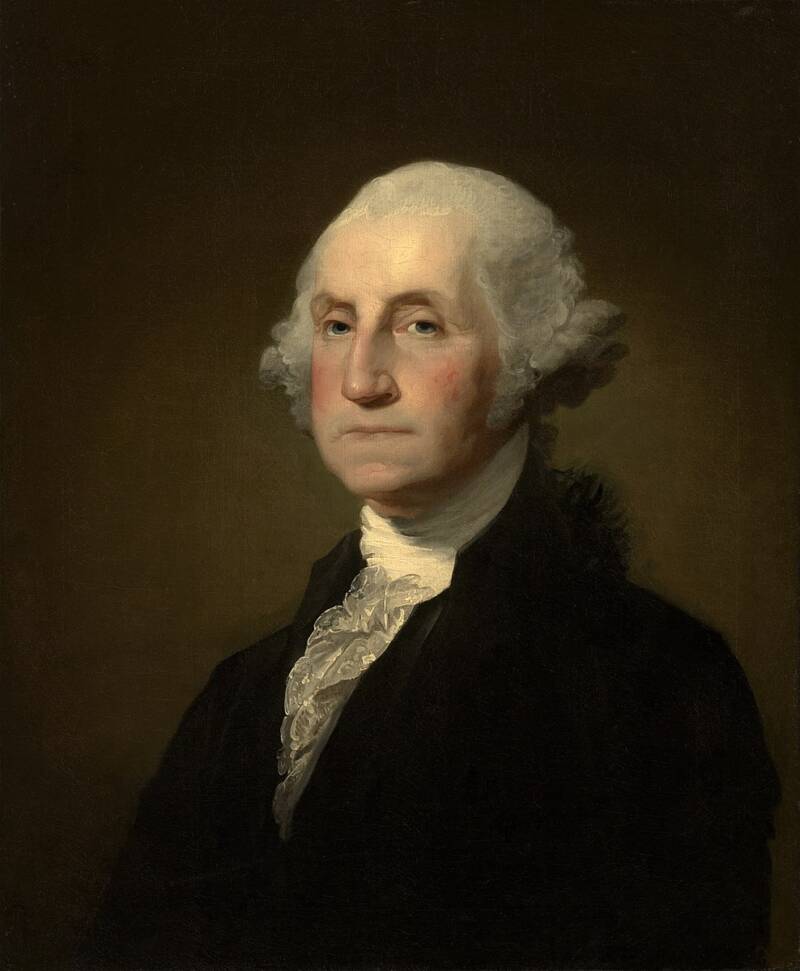
Wikimedia CommonsOnly one of George Washington’s slaves was freed when he died.
George Washington is revered for his prowess in war, his inability to lie, and his generosity in freeing his slaves. But the founding father actually lost more battles than he won and even though he promised to free his slaves upon his deathbed, he failed to do so.
When George Washington died in 1799, the whole nation ground to a halt. America’s first president was dead. All of America mourned and wore black armbands to honor him.
That is, everybody but the 123 slaves he failed to liberate before he passed. Washington had promised to free every single one of his slaves upon his death, it was even written in his will. But only a single slave, Revolutionary War hero William Lee, was freed immediately. Almost half of his Mount Vernon slaves remained in shackles for decades more.
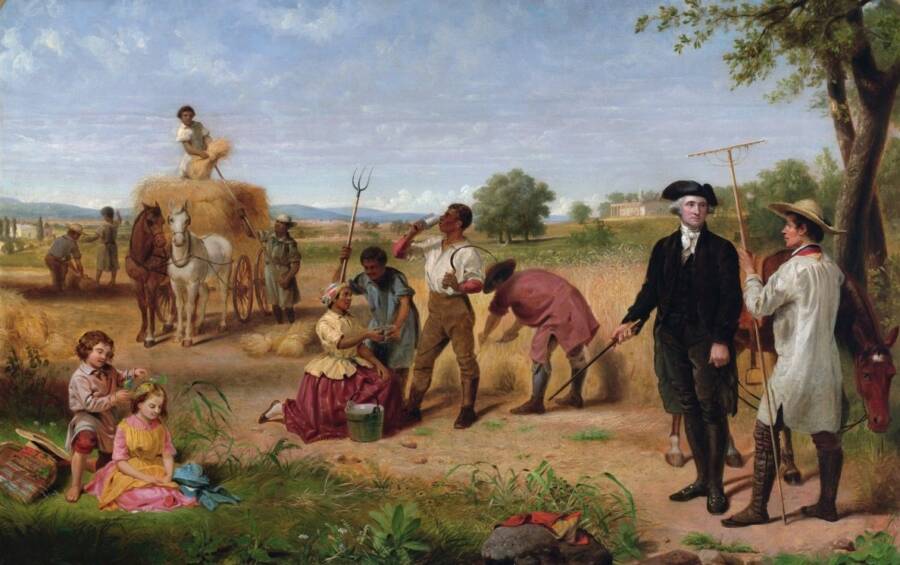
Wikimedia CommonsThe founding father alongside his slaves at Mount Vernon.
Apparently, the founding father only had the legal right to free half the slaves at Mount Vernon, the rest belonged to his wife’s family. Mrs. Washington only freed the rest of their slaves when she felt that they were plotting against her. Washington’s views on the peculiar institution changed throughout his life, but he ultimately rationalized keeping his own slaves.
Washington was no different than most of his wealthy Virginian landowners in this respect, however. He, like them, owned slaves who worked his land.
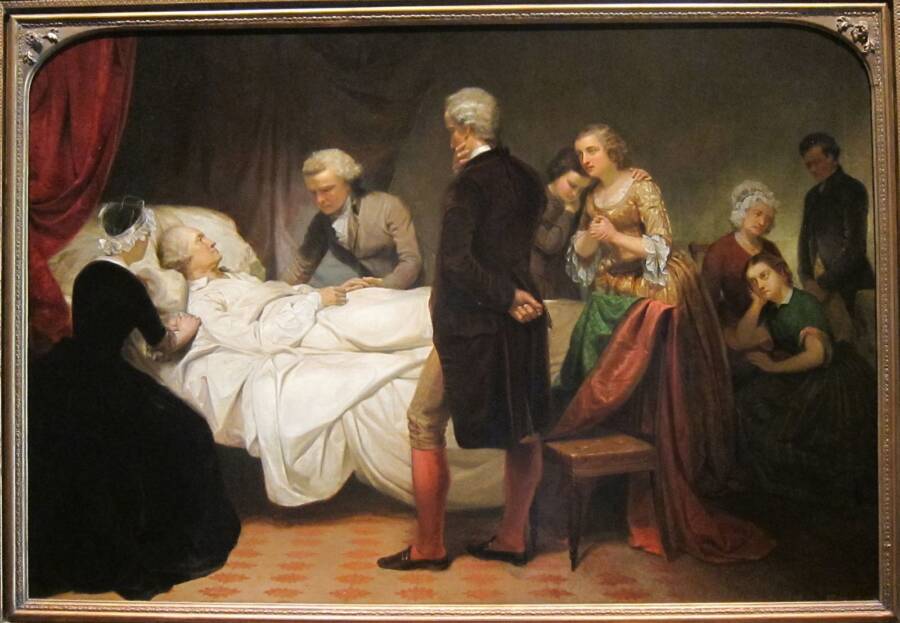
Wikimedia CommonsWashington also reportedly used his slaves to experiment with various farming techniques.
Apologists say that Washington treated his slaves well, but he still beat them and did not free anyone while he was alive.
John Hancock Was A Rabble-Rousing Smuggler
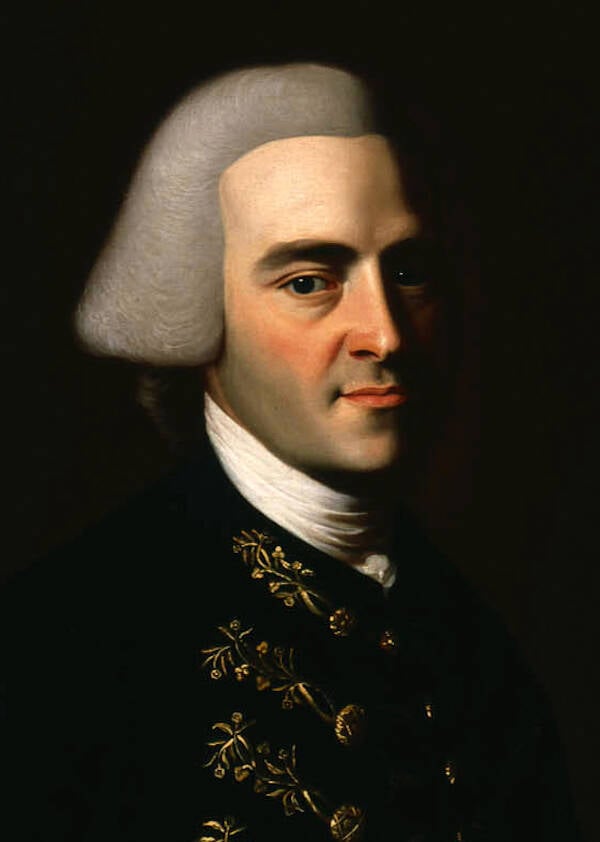
Wikimedia CommonsHe was so wealthy that he could — and did — finance most of the rebellions in Boston.
John Hancock could well be seen as an American anti-hero who outwitted and bit his thumb at British authority. After all, he was a wealthy shipping magnate who was so good at smuggling that he became known as “The Prince of Smugglers.”
He afforded his lavish lifestyle, which he was often criticized for, by smuggling Dutch tea into Boston aboard his ship, the Liberty. And when he was caught, he had the means to afford a promising defense.
But he was also an opportunist who used anti-British sentiment to profit off the people. He corralled unwitting citizens to protest British tax laws that hampered his business and funded the demonstrations himself. From the Boston Tea Party to the Boston Massacre, Hancock helped instigate and foment violence on the streets for his own gain.
Around the same time that the founding father entered local politics in 1765, British Parliament started imposing numerous tax regulations on the 13 colonies. Anti-British sentiment grew stronger every year, and Hancock found a way to capitalize on that.
When his ship was impounded by British authorities in 1768, Hancock was charged with violating tax laws, fined heavily, and taken to court. But since Hancock had become quite the popular figure in Boston, the seizure of his ship led to violence on the streets all in the name of liberty. British authorities eventually sent in military forces, and in 1770, things came to a bloody head with the Boston Massacre.
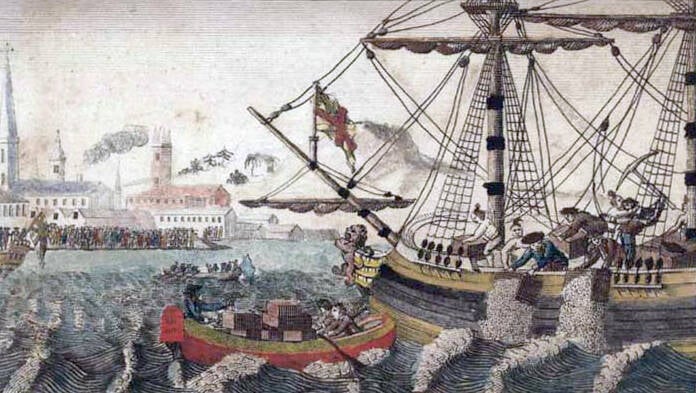
Wikimedia CommonsThe rebel group known as the Sons of Liberty led the charge during the Boston Tea Party and dumped 342 chests into the harbor.
The British sent in more than 2,000 soldiers in a city of 16,000 colonists to enforce Britain’s tax laws. Violence between colonists and British loyalists as well as the troops erupted soon enough, and John Hancock personally urged citizens to keep fighting. Ultimately, the armed Brits shot and killed five colonists.
The Boston Tea Party in December 1773 arguably only occurred with the help of smugglers like Hancock. When British Parliament imposed the Tea Act in May of that year, Hancock saw yet another opportunity to bolster his pockets. The legislation allowed the British East India Company to sell duty-free tea the colonies, which dampened Hancock’s own smuggling prospects in wake of the new monopoly. So he instigated the citizens of Boston to revolt and dump 342 chests of tea into the harbor.
John Hancock is credited as being the first signer of the Declaration of Independence. He was certainly on the right side of history in railing against British rule, but his desire for independence was not borne out of the need for liberty and justice, but out of self-interest.
Thomas Jefferson Owned Child Slaves
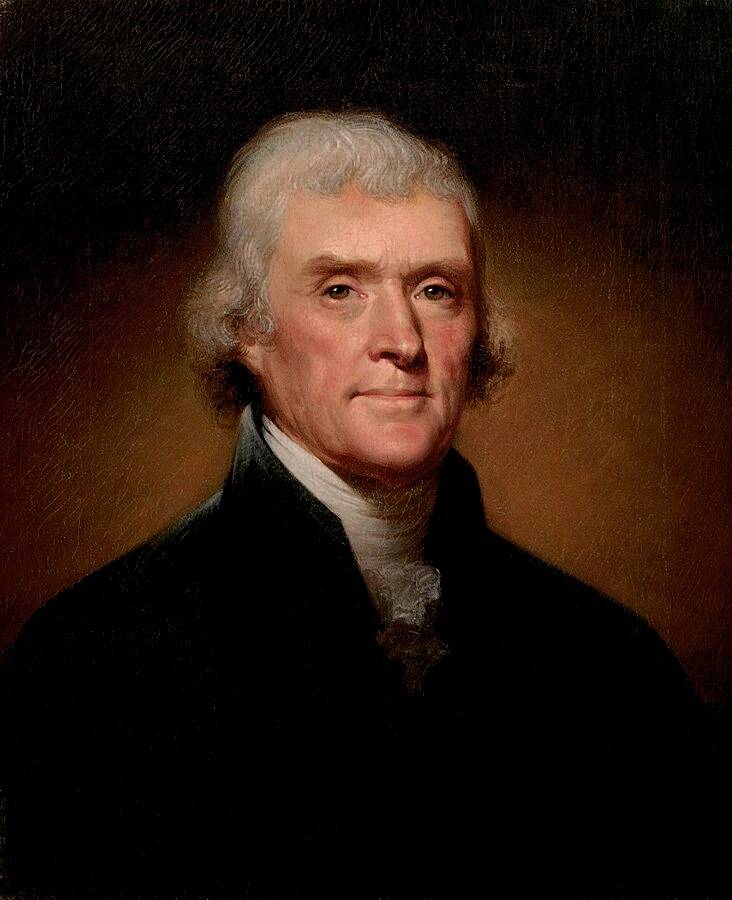
Wikimedia CommonsThomas Jefferson owned 600 slaves in his lifetime and raped 14-year-old Sally Hemings.
The founding father who coined the phrase “all men are created equal,” Thomas Jefferson, was horribly hypocritical.
Earlier in his career, the third president of the United States described the African slave trade as a “hideous blot on the country,” and a “moral depravity.” Jefferson was even one of the very few founders who consistently pushed back against the interest of Virginian slaveowners in the 1780s.
Unfortunately, he was swayed by how cost-effective and profitable the practice was. And Jefferson tragically had a knack for being a slaver, running a veritable kingdom of slaves.
The founding father’s Monticello estate, a private mountain-based plantation in Virginia, housed around 130 slaves at the height of its commercial success. He conveniently grew quiet about slavery during the 1790s, focusing his efforts on the estimated 600 slaves that would work for him in total, instead.
Four hundred of these men and women were born at Monticello and forced into a life of painstaking labor.
Monticello itself oddly resembled a small town and differed only in that it ran entirely on slave labor. Jefferson’s operations included blacksmithing, woodworking, textiles and farming, but he was particularly proud of his nail-making business.
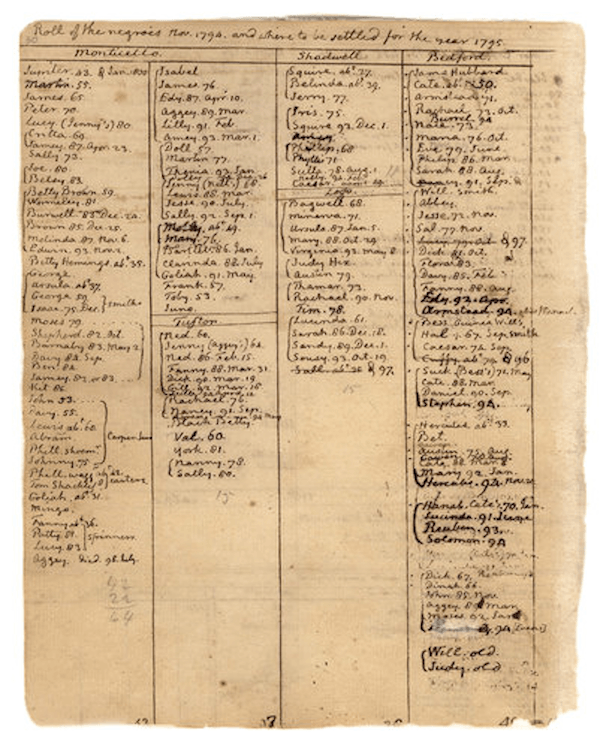
Wikimedia CommonsPage 30 of Jefferson’s 1795 farm book lists 163 slaves at Monticello.
The nail factory was so profitable that Jefferson bragged about it in numerous letters. To put into context how well it did, the annual grocery bill for the entire plantation was around $500 — which the nail factory covered within two months.
But the factory was also a breeding ground for child slaves. Jefferson used it to weed out the weak children and promote the harder-working ones. He would reward those who could make 10,000 nails per day with privileges such as extra food and leisure time, and punished the rest with lower rations, brutal whippings, and rags for clothing.
Jefferson also had no intention of freeing his slaves once he realized how profitable the practice could be.
The wealthy Virginian also feared that freeing America’s slaves would lead to a revolt. He, at one point, even wanted to ban free Black people from entering Virginia so that their autonomy wouldn’t inspire enslaved people to rebel.
“But as it is, we have the wolf by the ears, and we can neither hold him, nor safely let him go. Justice is tin one scale and self preservation in the other,” he wrote.
Based on his writings, it is perhaps safe to assume that the founding father was simply racist. He believed Black people were intellectually inferior while condemning white slavery:
“But the slaves of which Homer speaks were whites. Notwithstanding these considerations which must weaken their respect for the laws of property, we find among them numerous instances of the most rigid integrity, and as many as among their better instructed masters, of benevolence, gratitude, and unshaken fidelity… the blacks, whether originally a distinct race, or made distinct by time and circumstances, are inferior to the whites in the endowments both of body and mind.”
Remarkably, Jefferson’s transgressions didn’t end with enslavement.
Founding Father Thomas Jefferson Raped His Teenage Slave
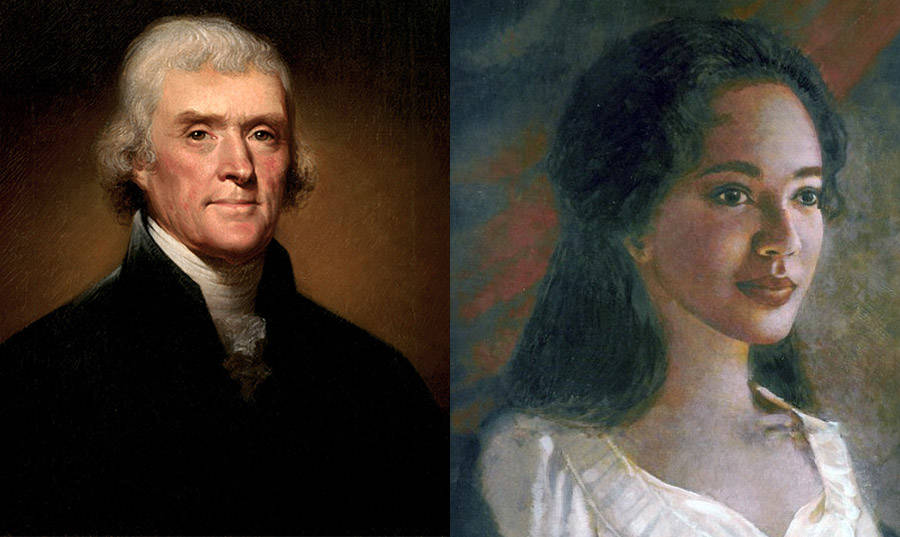
Wikimedia Commons/The Thomas Jefferson FoundationThomas Jefferson and Sally Hemings.
It was 1787 and Thomas Jefferson had been appointed to United States Envoy and Minister to France. He began periodically living in Paris where he invited his daughter Martha to join him along with her 14-year-old chambermaid, Sally Hemings.
Hemings was the daughter of Jefferson’s own father-in-law — John Wayles — who had raped his “domestic servant,” Betty Hemings. She was thus also the half-sibling of Jefferson’s late wife, Martha Wayles Skelton Jefferson.
Jefferson described her as “quite a child,” and “handsome (with) long straight hair down her back.” He added that she was “decidedly good looking.”
The year the United States Constitution passed into law, Jefferson raped and impregnated her.
Hemings and Jefferson eventually returned to Jefferson’s Monticello estate in Virginia where their illegitimate child died in its infancy. But Jefferson continued to rape Hemings. She ultimately birthed six more children.
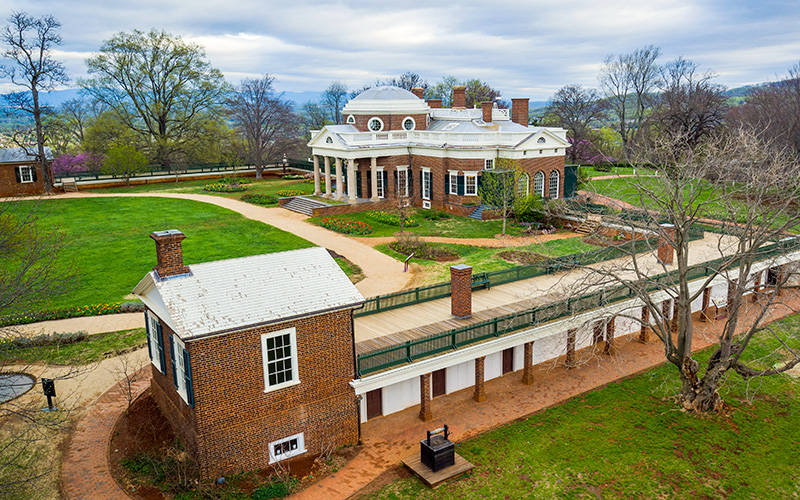
Monticello.orgExceedingly little is known for sure about Sally Hemings as a person, but it is assumed she lived in these quarters at Monticello.
Jefferson apologists argue that these offspring were not Jefferson’s and posited that they were perhaps, instead, his brother’s. Even Jefferson’s white daughter Martha had always denied this, but a 1998 DNA test and subsequent studies in 2010 proved otherwise.
The Thomas Jefferson Foundation Research Committee even admitted that the second president fathered a minimum of six of Hemings’ seven children. One of Hemings’ own children, Madison, claimed that Jefferson fathered all seven of them.
Patrick Henry Locked Up His Mentally Ill Wife
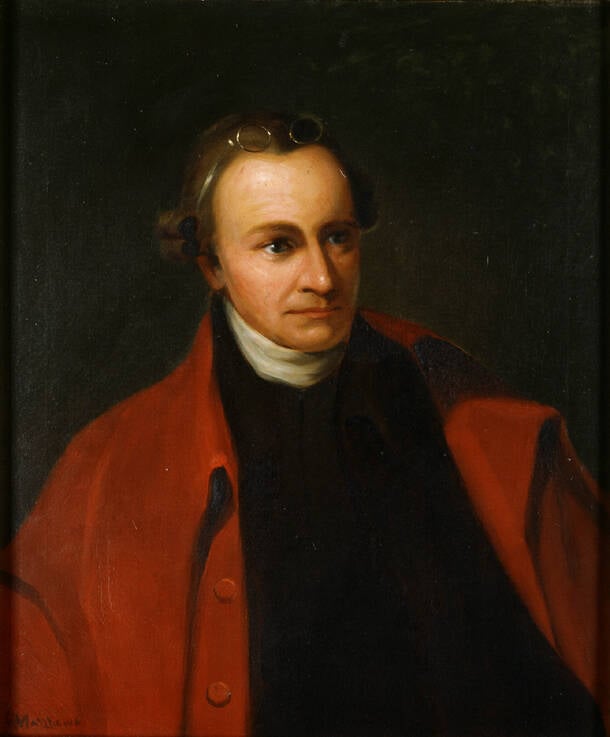
Wikimedia CommonsPatrick Henry refused to hospitalize his mentally ill wife even though he had the money.
On the eve of the American Revolution, Patrick Henry famously exclaimed “Give me liberty, or give me death!” But what most people aren’t aware of is that this founding father didn’t afford his wife the same freedom — and kept her locked up in the cellar.
Henry’s wife, Sarah, began to mentally decline around 1771 following the birth of their last child, Edward. At first, she appeared to be merely emotionally unsettled but then began to act out violently. Henry’s mother wrote, “We feel Sarah is losing her mind after the birth of little Neddy.”
Eventually, Sarah had to be restrained in a strait-dress to keep her from self-harm.
Henry resolved to keep her restrained in a room in the cellar of his plantation and ordered a slave of his to tend to her.
Despite the condition in which she was kept, some could even reasonably argue that Henry’s choice was better than the alternative, which was to send her to the Eastern State Hospital in Williamsburg, Virginia.
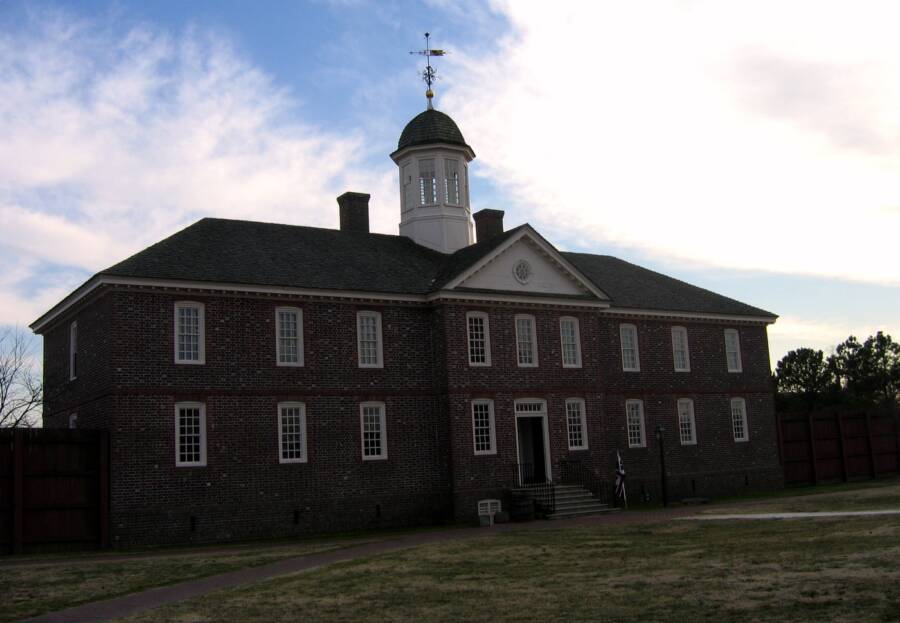
Wikimedia CommonsThe Eastern State Hospital was notorious for its torturous treatments.
The asylum had just recently opened by the time Henry’s wife had become particularly ill. But the treatments at Eastern State Hospital ranged from bleeding and blistering to being purposefully subjected to shock, pain, and terror. Patients were dunked into water while restrained.
Henry’s decision to leave her at home, even without medical assistance and shut in a room, was perhaps better than the alternative.
The woman died of unknown causes in 1775 and was buried in Henry’s backyard.
Alexander Hamilton Was Caught In The Nation’s First Political Sex Scandal
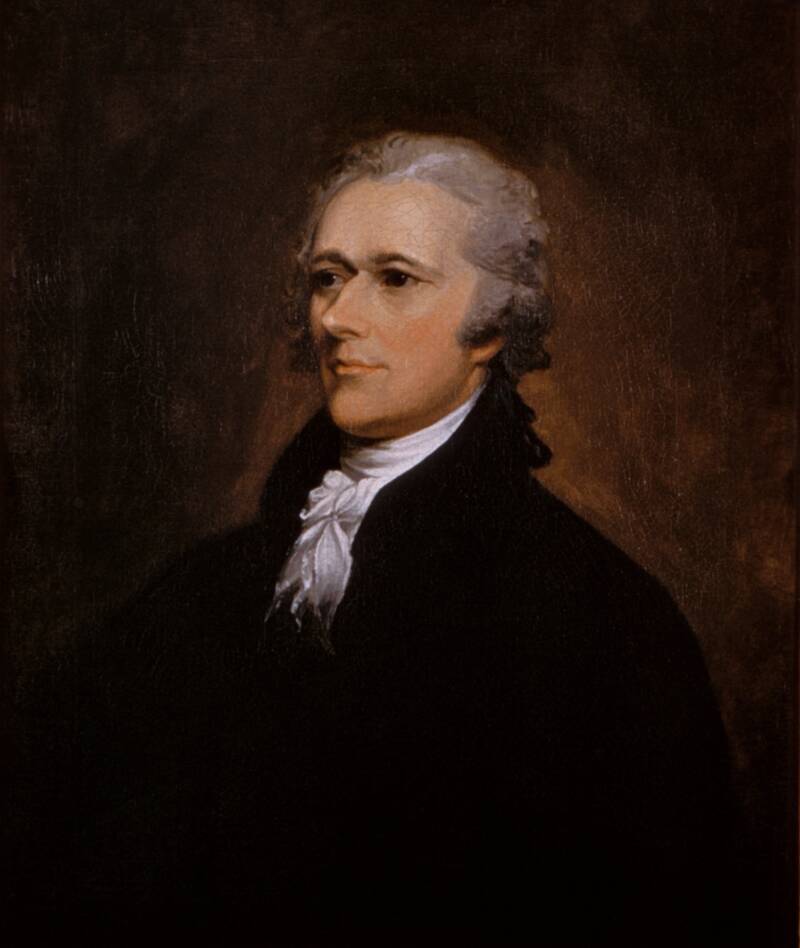
Wikimedia CommonsAlexander Hamilton would publish a 100-page confession on his affair that took the public by storm.
Alexander Hamilton was famously antagonistic. He was so contentious that that he was shot to death in a duel against his political rival, Aaron Burr, who he simply could not stop provoking for nearly two decades.
But Hamilton’s weaknesses weren’t limited to pride. He was also unfaithful to his wife, Elizabeth Schuyler Hamilton, who remained loyal to him even after he humiliated her and left her near destitute when he died.
In 1797, Hamilton published the Reynolds Pamphlet, a 100-page confession that recounted his affair with a married woman named Maria Reynolds.
According to the report, Reynolds had approached Hamilton at his Philadelphia home in the summer of 1791 asking for help after her husband had abandoned her. By Hamilton’s own admission, “Some conversation ensued from which it was quickly apparent that other than pecuniary consolation would be acceptable.”
They proceeded to have a sexual fling for the next few months, but when Mr. Reynolds returned and learned of the affair, he and his wife concocted a scheme to swindle Hamilton out of some cash. Hamilton wound up paying the couple $1,300 or one-third of his salary. This would be the equivalent of $25,000 today.
When the couple took their blackmail to Hamilton’s political rivals, James Madison and Thomas Jefferson, he decided to reveal the truth himself in a public confessional.
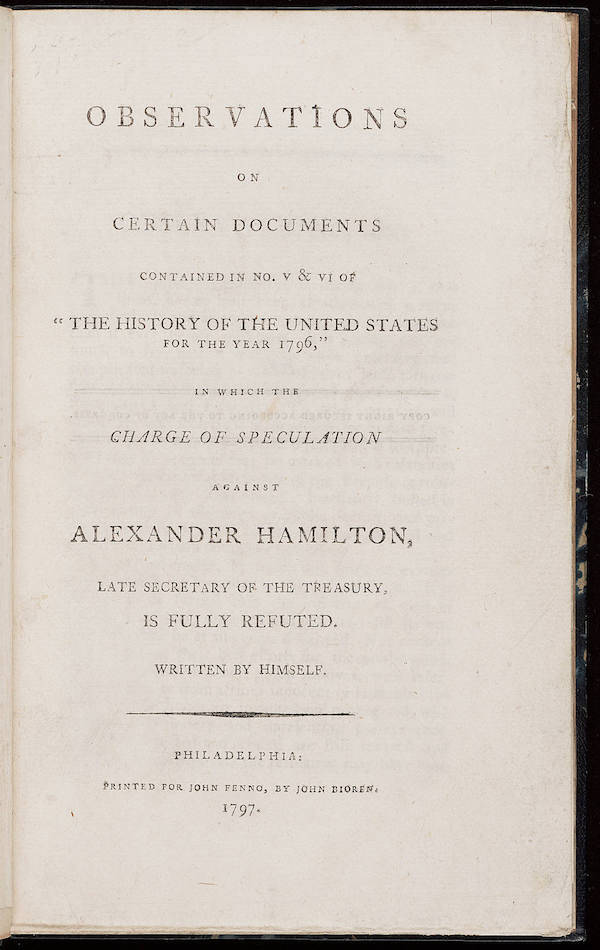
Wikimedia CommonsA copy of the Reynolds Pamphlet.
The press went haywire and even flooded papers with the rumor that Hamilton was sleeping with Schuyler Hamilton’s sister, Angelica Schuyler, as well. This was loosely based on a cheeky remark Angelica Schuyler made in a letter to her sister, which read:
“[I love him] very much, and if you were as generous as the old Romans, you would lend him to me for a little while.”
Unfortunately, Hamilton’s wife bore the brunt of the scandal and was blamed for her husband’s infidelity. “Art thou a wife?” wrote one newspaper. “See him, whom thou hast chosen for the partner of this life, lolling in the lap of a harlot!”
The founding father infamously died in his 1804 duel against Burr, a challenge that could have easily been avoided had he simply apologized. Instead, he was shot and killed because of his own pride.
To assess the integrity of the founding fathers retrospectively could be a fool’s errand as the actions of these men were in part, products of their time. Nonetheless, they were troubling individuals who owned people, raped them, or were utterly unscrupulous.
As such, perhaps it’s best not to view these men as figures carved in stone but as flawed individuals with shades of gray.
After learning about seven awful things that the founding fathers did, read up on the true story of who wrote “The Star-Spangled Banner.” Then, learn the most fascinating fact about each U.S. president.
